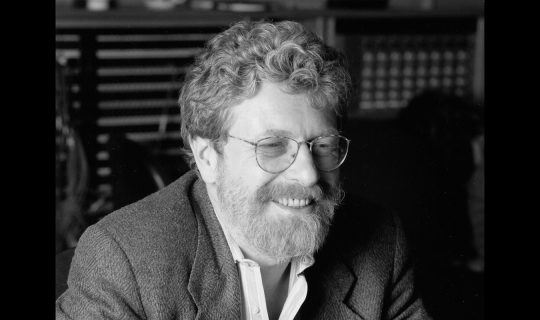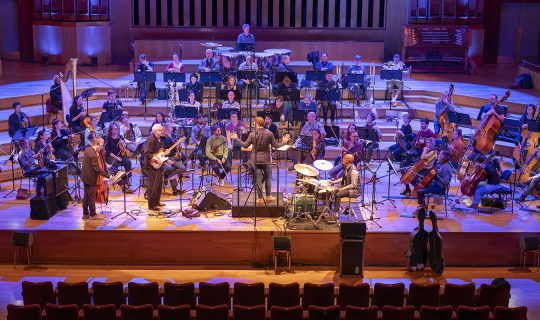November 11, 2012
It’s been 55 years since Sonny Rollins went into the studio to record Newk’s Time, his third album for Blue Note, and though much has changed for the saxophone colossus during the past half-century, much remains the same. This enduring classic, which gets its title from the striking resemblance between Rollins and erstwhile Brooklyn Dodgers pitcher Don Newcombe, features bassist Doug Watkins, pianist Wynton Kelly, and drummer Philly Joe Jones, bolstering the restless effervescence of one of the players who defined the sound of the tenor saxophone.
Rollins covers three popular songs: “The Surrey with the Fringe on Top,” from Oklahoma!; “Namely You,” from Li’l Abner; and “Wonderful! Wonderful!”, at the time a recent hit for Johnny Mathis. Abandon any perception that Rollins might have chosen his repertoire with a wink, though; in fact, he had great affection for these tunes. He recently held forth from his home in upstate New York on his never-ending quest for musical nirvana, his love for Fred Astaire and Ginger Rogers, and meeting President Barack Obama.
It’s an understatement to say that I’m a huge fan of yours. I grew up playing the saxophone, and playing “Airegin” and making it through the changes was like a rite of passage, if I could ever do it.
For me, too, by the way.
You just turned 82. How has your perspective changed over the years, and how do you keep it fresh?
I would say that I was fortunate in that I was a person who was never a finished musician, I was always learning more, getting more. I thought at one time that that was a handicap, but it turned out to be a blessing, because my style is always changing. I’m always evolving, or devolving. Some people liked me back in 1957, and so who knows, but the point is, I’ve never been able to be a musician that was proficient enough to play the same thing every night. That skill, I can’t do that. I’m not that good—I can’t play the same. I’m always completely improvising, playing what happens in the moment, as far as that concept can be realized in terms of the performance. So that’s why you might say that I keep fresh. I keep fresh because I’m never the same. I’m always trying to reach a point in my music which I haven’t reached yet. It’s a certain perfection, if you will, or there’s a sound that I haven’t reached, and I know that, and I’m striving for it, so that keeps me always different.
Looking back at the Newk’s Time session, almost 55 years ago to the day, you had Wynton Kelly on piano, Doug Watkins on bass, and Philly Joe Jones on drums. What was it like working with those guys?
They were all great musicians, all well-known at the time. Doug was a great player that was on my Colossus record. He was a very fine player, in demand by all the people who were hiring jazz bassists. Of course, Philly Joe Jones, we know his reputation and his work with Miles Davis and so many other people, and Wynton Kelly was also with Miles. I knew Wynton from around New York. He was from Brooklyn, but I didn’t hold that against him. He was a good player, he was very well-known and very respected. So it was really a break for me to be able to hire those guys. They were all top-notch people, and it was a real pleasure playing with them.
On Newk’s Time, you recorded “The Surrey with the Fringe on Top,” which is from Oklahoma! and “Namely You” from Lil’ Abner. You’d already done Way Out West. Why record tunes that were so quintessentially unhip?
I was really blessed by having a mother who always introduced her children to the arts, and I remember being a very small boy when I went to see The Pirates of Penzance by Gilbert and Sullivan. I used to go to City Center on 55th Street. They had a lot of operettas there. I went to Broadway shows. I was introduced to these cultural archetypes from a very, very early age, and as a matter of fact, I actually saw Li’l Abner on Broadway when I was older. I like all this music. I was very fortunate—I had a lot of music in my household, but specifically, I grew up listening to a lot of what you would refer to as popular music. So to play it wasn’t anything strange for me, because I liked the songs. I like “Namely You,” and “The Surrey with the Fringe on Top” I probably saw in the movies. I had the freedom to choose my repertoire, which I’ve always had, even with producers. They’ve always realized, “Well, Sonny is his own producer, because the music he plays is music which he relates to, so whatever he does is okay.” So I was never influenced not to play Broadway show tunes or anything of that sort.
What would have been John Coltrane’s 86th birthday passed recently, as did the 45th anniversary of his passing. Looking back on it now, what was it like to work with Trane, and does that experience still influence your playing?
Sure. When Trane was alive, it was a little bit difficult for me to take a lot of music from him because we were looked at as adversaries, so it was sort of impossible. I had to be different. But through the years, of course, I’ve been able to incorporate his many contributions. He was a great friend of mine, a great person, a great musician. The funny part about this whole thing with Coltrane was that I was four years his junior, yet I was famous before Coltrane. I was famous and had a reputation in music—Coltrane was invited to play on one of my records. So at first, it was sort of funny, but then, as the years went by, I realized, Coltrane was Miles’s age, and those guys had four more years at it. I was able to realize that. Coltrane was older than I was, I was just more famous in the business than Coltrane. But what can you say? One of the greats of our music, very few people would be in that firmament with Coltrane. It was great that we knew each other. He was a beautiful person, and I was very privileged. The music he gave to the whole world, I was finally able to use some of it after his passing.
You’ve influenced so many players. You said you listened to a lot of popular music growing up. Who are some of those influences and who are the people who influenced you the most?
Well, I was influenced a great deal by everything and everybody. My older brother, who was five years my senior, he was a very serious European classical violinist. So I used to listen to him practice in the house. So I heard classical music. I heard a lot of people on the radio. And in those days, the movies were sort of what television is today, but it wasn’t in your home, so you had to go to the movie shows. I liked people like Bing Crosby and Louis Armstrong. I liked Frank Sinatra—I saw some of those movies. Martha Raye, I think I first saw her singing “I’m An Old Cowhand” from my Way Out West album. I liked Jimmy Durante, anybody that was a performer. That’s who influenced me. I liked people like Nelson Eddy and Jeanette MacDonald. I liked Ginger Rogers and Fred Astaire. So this is my background. I was born in Harlem, and people have to understand that just because you’re black and you’re born in Harlem doesn’t mean that you just like black music. No, I like music, and in America, I was exposed to a lot of music in my household, and I listened to all of it. It’s all who I am.
Not too long ago, you got a Kennedy Center award from President Obama. How do you feel about Barack Obama?
One of his people told me that he doesn’t like all kinds of jazz, but he likes me. So I was very flattered. Later on, I met him, and he said, Sonny, I used to listen to your music when I was in school and it helped me get through my school days. That’s very flattering to me. That’s part of what I do. My music is supposed to reach out and influence other people, beyond my own practicing and studying. It’s supposed to be for people.
Photos courtesy of Mosaic Images




